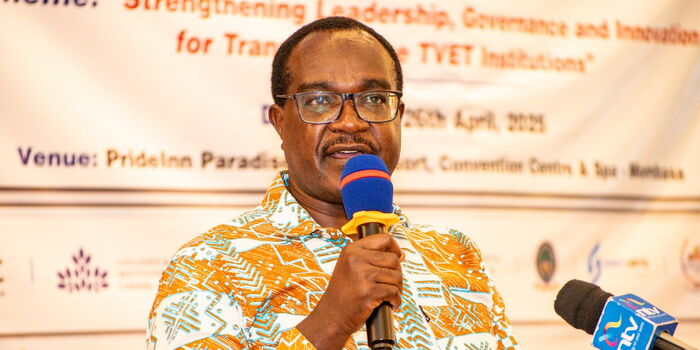Education Cabinet Secretary Julius Ogamba has come out to firmly deny claims that the government has scrapped funding for free primary and secondary education in Kenya.
Speaking to the media on Saturday, July 26, Ogamba clarified that while there have been reductions in capitation, the free education program remains in place.
He explained that the government had only adjusted the capitation amount due to financial challenges in the current 2025/2026 budget cycle. According to Ogamba, the rising number of students enrolling in schools has put extra pressure on the existing funds.
Despite these difficulties, he emphasized that the government is still fully committed to ensuring every child gets access to free basic education.
“The government policy provides that each senior school student should receive Ksh22,244,” Ogamba explained. “However, due to the current financial constraints, we haven’t been able to meet that target.
The student population keeps growing every year, but the capitation figure hasn’t been increased to match that growth. That’s why we’ve only reduced the capitation—not abolished free education,” he added.
Ogamba stressed that free and compulsory basic education is a constitutional right that every child in Kenya is entitled to, and insisted that the government has no plans, nor the legal power, to take that right away.
To help bridge the funding gap, he said that the Ministry of Education, in partnership with the National Treasury, is actively lobbying the National Assembly for increased budget allocations.
He also reassured the public that President William Ruto’s administration is doing everything possible to make sure every child in the country has access to quality education, regardless of the current economic challenges.
Ogamba’s statement came shortly after Treasury Cabinet Secretary John Mbadi stirred concern by admitting that the government is struggling to fully fund free basic education due to financial limitations.
Appearing before the National Assembly’s Education Committee on Thursday, July 24, Mbadi explained that the government can no longer afford to provide the full capitation amount of Ksh22,000 per secondary school student.
He said they are now only able to disburse Ksh16,600 per student, distributed in portions of 50%, 30%, and 20% for each school term.
“If you do the math by dividing the total education budget by the number of enrolled students, you’ll find that instead of allocating Ksh22,000 per student, we’re now managing just Ksh16,000,” Mbadi told lawmakers.
He further warned that unless the financial strain eases, universities could also face significant cuts. This could include reduced capitation for university students and possibly even the closure of some university campuses.
While the government insists that free education is still intact, both CS Ogamba and CS Mbadi have made it clear that tough financial decisions lie ahead as Kenya grapples with a growing student population and limited resources.
Join Gen Z New WhatsApp Channel To Stay Updated On time https://whatsapp.com/channel/0029VaWT5gSGufImU8R0DO30


